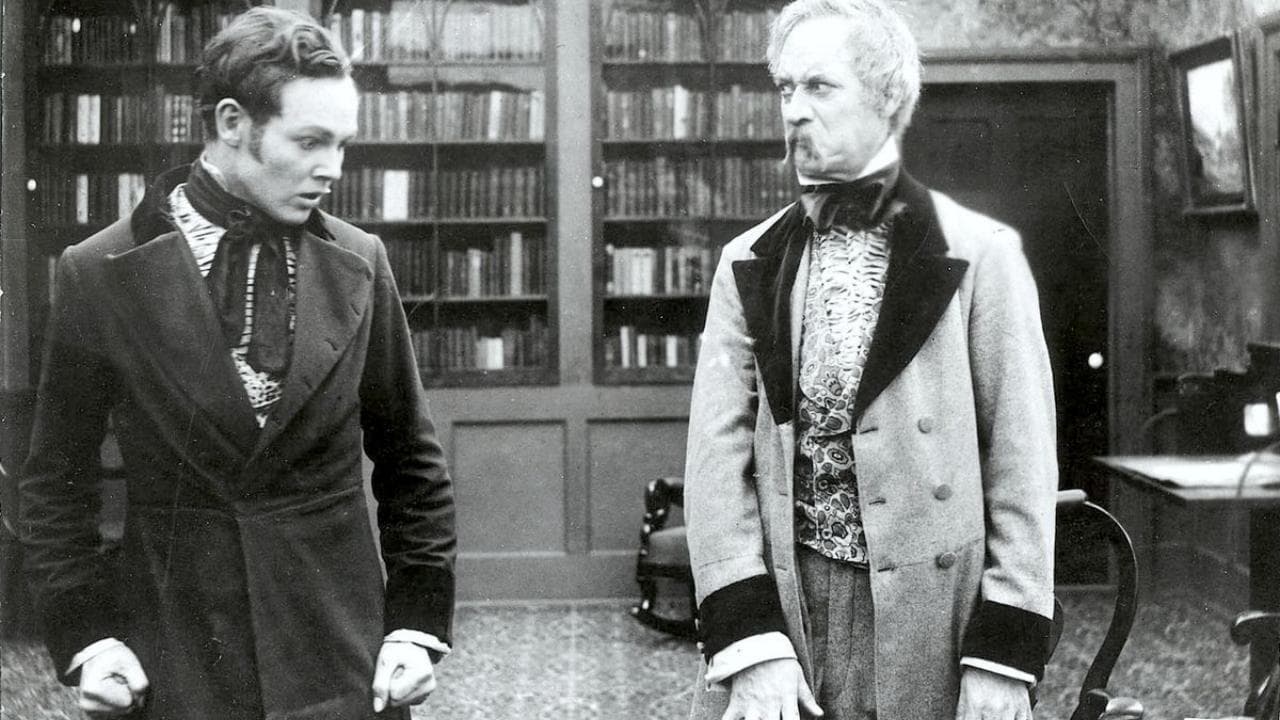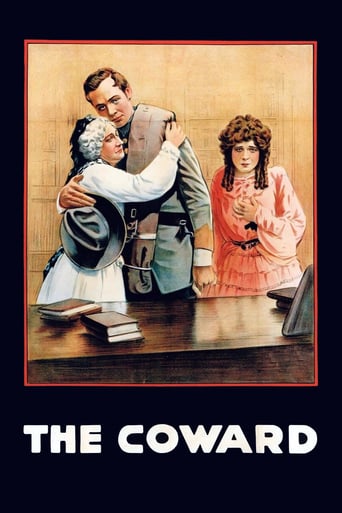

A story of the old code of family honor at the dawn of the Cibil War and the way that reluctance to throw one's life away was treated with disgrace and exile. The acting is overwrought by today's standard but mixed in with the exaggeration are some bits of touching human emotion.Seeing as the film is now one hundred years old and was made about facts that at that point were only fifty years in the past the film makers were able to have a perspective on events that is impossible to us now. As such this is a precious piece of cinema. As a movie it's a hoary old chestnut but as an historical document it's fascinating. The damage to the print actually adds to the feeling that you're watching a series of Matthew Brady daguerreotypes come to life.
... View More"The Coward" should be seen in order to disprove the oft-made point that film acting in the early 20th century was overdone. The young and fresh-faced Charles Ray, who steals this Civil War melodrama from then-veterans Frank Keenan (a dead ringer for Mark Twain) and Gertrude Clair, was one of the most naturally appealing young male actors of his time, and recognized as such by contemporary audiences and critics. Few of his films have survived, and luckily this rather well preserved relic contains generous helpings of his talent and magnetism. Sadly, his career petered out in the 1920s.There is little of general interest, however, in this simple but overly drawn-out Civil War story of a young man (Ray) whose soldier father (Keenan) forces him at gunpoint to enlist in the Confederate Army for the sake of family honor, if nothing else. There follows a melodrama of desertion, heroism and redemption which could have been told in about 30 minutes if some of the close-ups had been kept to a realistic length, but this was 1915 and cinema audiences apparently needed 60 seconds or so to identify an emotional state from an on screen face.Some of the indoor scenes bear the telltale sign of having been shot outdoors to take advantage of the natural light (in a parlor scene Keenan's cigar smoke rushes away from his face and the dining room table cloth flutters in the breeze).Keenan's performance, mostly slow-motion gestures and smoldering glares, seems bizarre by today's standards, but it can't be his fault because the camera and editing are obviously cooperating.As usual for the era, house slaves are played by white actors in blackface.
... View MoreThis interesting period melodrama ties together several themes, and generally succeeds in examining them during the course of the story. Neither of the most prominent characters (the father and son) are especially sympathetic, and yet the story is such that it involves your emotions for both of them, even when their actions are discreditable.The 'coward' of the title is the son of a retired colonel, whose father insists that he enlist in the Confederate Army when the Civil War begins. "The Coward", like an earlier Thomas Ince feature, "Drummer Boy of the 8th", depicts the unfounded mass excitement that accompanied the outbreak of war, this time on the other side. Here, the son is practically the only one not filled with enthusiasm for the South's war effort. The crisis comes later on when the 'coward' is the only one who knows a piece of vital information.The story that develops features several interesting turns, and it brings out various points not only about bravery and duty, but about family relationships and other themes. Some aspects of its perspective may seem a little odd now, but it presents its ideas believably and without overstatement.Both the action sequences and the confrontations between father and son are often given Ince's attentiveness to detail and composition. Whether intentional or not, in a number of the family scenes the characters' movements are particularly deliberate, with the effect of drawing out their sometimes uncomfortable conversations, and thus increasing the tension. There is also quite a contrast established between the very civilized study in which the father repeatedly lectures his son, and the brutal tactics that he uses to get his son to do his bidding.Civil War features were quite popular in this era, and there are others that are better remembered, but this movie has several strengths, and it provides a slightly different perspective of its own.
... View More"The Coward," a 1915 silent era Civil War flick, was designed, written and directed to be enjoyable North and South of Messrs. Mason and Dixon's line. Today it's a curiosity piece both as entertainment and as history (I'm showing it in a few weeks in my law school legal history seminar, "Slavery, the Constitution and the Civil War." Our un-hero is a finely turned out Southern lad, popular with the demure lassies and scion to the small but well-kept estate of a former colonel. The fellow lives with his parents and their two devoted slaves, a cook and a sort of valet-butler.The call to arms, to defend the South (the South was invaded?), comes and the boy heads to the recruiting station where his contemporaries are eagerly lining up to doff formal attire and don uniforms. He chickens out, goes home and confesses to Pa that's he's chicken. No, thunders dad, no member of our family can be a coward. Get thee back and sign up.He does so but at the first sign of danger, while on picket duty, he deserts and skedaddles home. Mommy embraces him, the slaves try to hide him and Pa has a royal fit when he finds his worthless, gutless offspring gulping down milk and cookies in the kitchen.Determined to salvage family honor, Pa enlists as a private, replacing his son. Meanwhile, Union officers have occupied the family home and a hiding in the attic deserter overhears their battle plans. Guess how the story develops from there.A tale of honor cravenly lost and then heroically redeemed, "The Coward" is the kind of satisfying melodrama that early moviegoers loved. The actors magnify their facial expressions to compensate for silently mouthed dialog.Southerners watching "The Coward" could bask in the family loyalty to the Confederacy and the pliant, loving submission of slaves. Northerners saw an honorable foe whose forces but not spirit could be beaten.A neat relic from the vaults of the silents.8/10
... View More